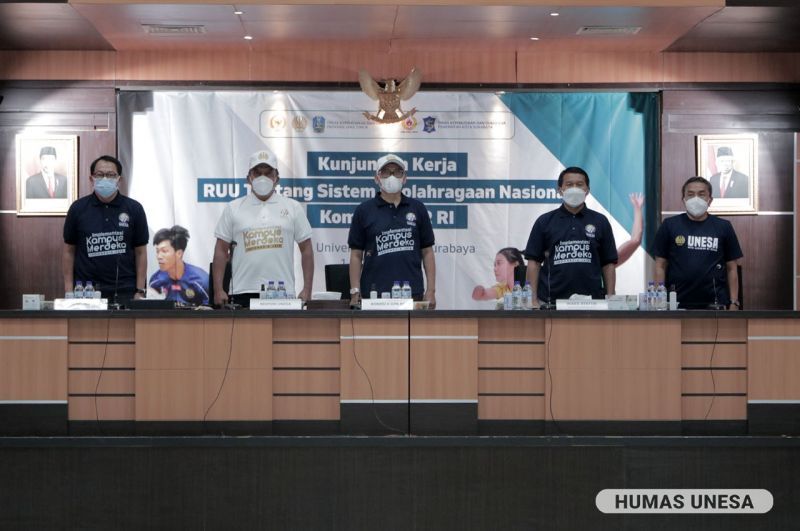
www.unesa.ac.id
Unesa.ac.id, SURABAYA_The government is getting serious about improving Indonesia's sports achievements. After launching the Grand Design for National Sports, the government and the Indonesian House of Representatives began discussing the National Sports System Bill (SKN) on amendments to Law Number 3 of 2005 concerning the National Sports System. For this purpose, the House of Representatives Commission X held a working visit to UNESA on the 11th Floor of the UNESA Rectorate Building Lidah Wetan on Saturday, October 02, 2021.
Deputy Chairman of Commission X DPR RI, Dr. H. Abdul Fikri Faqih, MM., stated that the amendment to the law is an urgent need to answer all problems in the national sports world. The journey of Indonesia's sporting achievements has had its ups and downs. Even sports achievements at the regional and international levels continue to decline.
At the 2020 Tokyo Olympics, Indonesia was ranked 55th in the world with one gold, one silver and three bronze medals. Compared to the 2016 Rio de Janeiro Olympics, Indonesia is ranked 46th in the world. "Indonesia is down 9 places compared to the 2016 Olympics," said the Chairman of the Committee X of the Indonesian House of Representatives (DPR RI) Kunker Team. Because of this condition, there are several root problems that are discussed and addressed with all parties, including universities, so that solutions can be found.
On that occasion, UNESA sports experts and academics highlighted and proposed many things to the SKN Bill. Some of them; first, in the aspect of sports awards, UNESA Chancellor Prof. Dr. Nurhasan., M.Kes proposed a clear and standardized reward system for athletes who participated in various matches.
The award can be in the form of scholarships, jobs, extraordinary promotions or honors. This has long been implemented at UNESA, athletes are given free college scholarships, then given a place at UNESA either as lecturers or special coaches to improve sports achievement. "That way they will be enthusiastic and we hope that there are standard rules, and all parties can give awards," he said.
Second, Prof. Dr. Ali Maksum, S.Pd., M.Si Professor of UNESA highlighted the management aspect of the institution. For him, the Indonesian Olympic Committee (KOI) and the Indonesian National Sports Committee (KONI) could be merged. However, it must be done with care and consideration. "If you want to be merged, it's good, but there must be a reinterpretation of the institution, so that the scope and duties and authorities are clear," he said.
Third, on the technological aspect, UNESA academics propose the application of national sports big data. All athletes in various regions and cities or districts are recorded and provided in the form of an application. The identity of the athlete is recorded where the training is, who the coach is, how it is progressing, what are the achievements. When athletes are included in competing in national and international championships, it is based on these data.
"So the selection system is precise and objective based on technology," said Dr. Moch. Purnomo, M.Kes Head of the Center for the Study of Sports Science UNESA. Fourth, so that data collection can be maximized, Purnomo also proposed the athlete registration number (NIA). According to him, big data and NIA have been researched and implemented in stages at UNESA. "This experience at UNESA is what we propose to the council so that it can be a reference in the discussion of the bill," he said.
Fifth, Purnomo also stated that the application of sport science in the Indonesian sports world should be carried out optimally. It is time for Indonesia's sporting achievements to be based on science, science and technology. That's what some countries in the world are doing and it's no wonder their sport is advancing. Sport science welcomes big data. In this way, he believes Indonesia's sports achievements can improve in the future.
Sixth, UNESA academics also proposed a sports transformation, from the paradigm of sport as a hobby to sport as a profession. Therefore, there needs to be competency requirements that must be regulated. Then there is the proper respect for coaches at all levels. So that being a coach is no longer a side job, but actually a profession and is taken seriously based on competence. "They also need to be paid for their sweat commensurately, so that there is enthusiasm, there is a work ethic and can focus on training," he said.
Seventh, of all that, UNESA academics want sport to be socialized first. So that people are happy to move, healthy and fit. When people are happy to move and exercise, then the best talents of the country will emerge from various regions and of course that is positive for increasing Indonesian sports achievements. Therefore, the next proposal is for sports cadres and sports villages in each village and sub-district.
On that occasion, the ranks of the Indonesian House of Representatives Commission X, UNESA leadership ranks and UNESA sports academics were present. In addition, there were also representatives from the East Java Dispora, East Java KONI, East Java NPCI, East Java KORMI, East Java PASI, Surabaya Dispora, Surabaya KONI, and coaches and several athletes. [UNESA PR]
Share It On:






